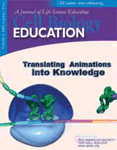“Shrink Wrapping” Lectures: Teaching Cell and Molecular Biology within the Context of Human Pathologies
Abstract
Students are most motivated and learn best when they are immersed in an environment that causes them to realize why they should learn. Perhaps nowhere is this truer than when teaching the biological sciences to engineers. Transitioning from a traditionally mathematics-based to a traditionally knowledge-based pedagogical style can challenge student learning and engagement. To address this, human pathologies were used as a problem-based context for teaching knowledge-based cell biological mechanisms. Lectures were divided into four modules. First, a disease was presented from clinical, economic, and etiological standpoints. Second, fundamental concepts of cell and molecular biology were taught that were directly relevant to that disease. Finally, we discussed the cellular and molecular basis of the disease based on these fundamental concepts, together with current clinical approaches to the disease. The basic science is thus presented within a “shrink wrap” of disease application. Evaluation of this contextual technique suggests that it is very useful in improving undergraduate student focus and motivation, and offers many advantages to the instructor as well.



